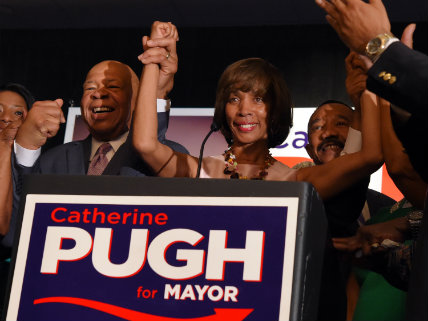Baltimore Mayor Supported $15 Minimum Wage Until She Learned What It Would Do to City's Economy
It's no April Fool's joke. Mayor Catherine Pugh vetoes a $15/hour wage mandate, citing economic concerns.

During the 2016 campaign, Catherine Pugh was one of dozens of Democratic politicians calling for the implementation of a $15 per hour minimum wage.
Since being elected mayor of Baltimore in November, though, Pugh has changed her mind about the merits of forcing employers to pay such a high hourly rate. Last week, Pugh announced she would veto a $15 minimum wage bill passed by city council, citing concerns about how it would hurt the city's economy, nonprofits and charities working in the city, and the city government's bottom line.
After doing "some research," Pugh said at a press conference on March 24, "it is not appropriate at this time that I will sign this bill, so I am vetoing this bill."
Pugh said the bill would not be in the best interest of Baltimore's 76,000 unemployed workers and would drive businesses out of the city to the surrounding counties.
Watch Pugh's press conference here:
My Statement on Baltimore City Council Minimum Wage Legislation https://t.co/dZskpLbtXl
— Catherine Pugh (@MayorPugh50) March 24, 2017
The minimum wage increase would drive up costs for the city government too. Over the next seven years, the Pugh administration estimated the bill would cost the city $116 million, including the expense of paying city workers a higher minimum wage, The Baltimore Sun reported.
The minimum wage in Baltimore will increase this year and again next year, along with the rest of Maryland. State lawmakers passed a law last year raising the statewide minimum wage to $9.25 on July 1, 2017, and increasing again to $10.10 in 2018.
"I believe it is in the best interest of the city that we follow the state," Pugh said.
The city council may yet overrule Pugh and implement the $15/hour minimum wage in Baltimore. The Baltimore Sun reports that Council President Bernard Young, who supported the minimum wage bill, has not yet decided whether to hold a vote on overriding the mayor's veto.
Donald C. Fry, CEO of the Greater Baltimore Committee, a regional organization including business and civic leaders, said in a statement that the $15 minimum wage would have "threatened jobs, made Baltimore an island surrounded by counties with lower business costs, and hit the city budget with millions of dollars in higher labor costs it simply cannot afford." Fry applauded Pugh for "demonstrating prudent fiscal management."
Indeed. Raising the minimum wage would not solve Baltimore's economic troubles, and would likely only add to them. While support for a $15 minimum wage has become something of a litmus test for progressive politicians, the true test of any politician should be whether he or she is willing to set aside campaign trail rhetoric that flies in the face of economic reality. Signing the bill would have made progressive pols and activists happy—one Baltimore city councilman called Pugh's decision "beyond disappointing" and a minimum wage activist group said it would remind voters of Pugh's "broken promise"—but there's no honor in following through on a promise to do more damage to an already struggling city's economy.
Pugh's decision to veto a $15 minimum wage bill isn't disappointing in the least. More politicians should learn from her example of valuing economic reality over populist rhetoric.
That's no joke.


Show Comments (66)